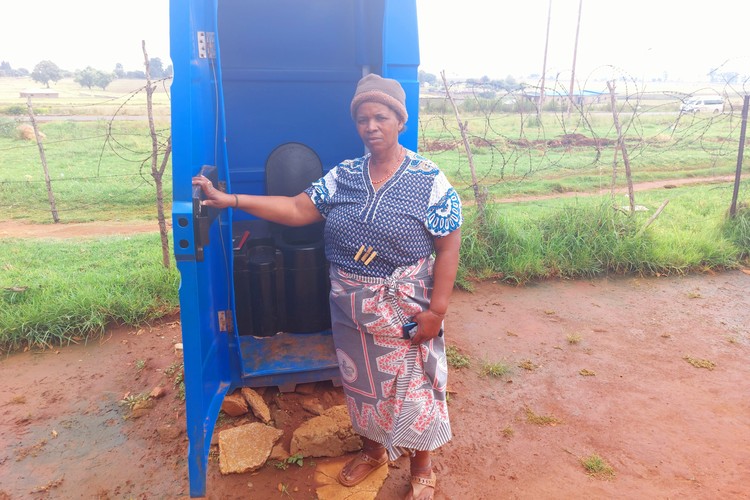
18 April 2024
Pensioner Mapule Moagi shares this chemical toilet with nine relatives. About 100 families from Langaville Extension 8 want the City of Ekurhuleni to build them permanent flushing toilets. Photo: Kimberly Mutandiro
Pensioner Mapule Moagi has been sharing a chemical toilet with nine other relatives since 1993 in Langaville Extension 8, Ekurhuleni.
The 100 households in the settlement had their hopes crushed last month when they lost a court battle to compel the City of Ekurhuleni to rezone the area as residential and to provide them with proper flushing toilets.
Families say the chemical toilets fill up quickly and the municipality only cleans them once a week, sometimes only every two weeks.
Moagi told GroundUp she had been looking forward to building a house on her plot once the City installed flush toilets, but her plans are now on hold.
“We don’t understand how we lost the court case when we are still facing challenges with these chemical toilets. The community will not give up the fight for flush toilets,” said Moagi.
“What surprises me is that the municipality installed electricity, but the area is not approved for housing,” she said.
Langaville Extension 8 has formal RDP houses interspersed with zinc and wood shacks. The residents argued in court that while the RDP structures had been provided with water and permanent flushing toilets, people living in adjacent informal structures only had access to communal taps and chemical toilets.
The residents are people the City relocated from land earmarked for other projects.
The municipality supplied chemical toilets in 2011 as a “temporary” measure after the court ordered the City to install them.
In 2020, the residents returned to court with the help of lawyers from the Center for Applied Legal Studies (CALS) to have the City’s continued provision of these chemical toilets declared unconstitutional.
The residents argued that it was unconstitutional to expect them to use the under-serviced, over-utilised, unsafe and unhealthy forms of sanitation indefinitely. Many of the residents don’t qualify for formal government housing and now want the City to allow them to build their own brick structures on their plots.
But the municipality said it could not provide permanent sanitation because the land was zoned for “community use” and not residential.
On 14 March, the Johannesburg High Court ruled that while residents had cause to complain about the chemical toilets, the City was struggling with budget constraints.
“We are not going to vote until the people on top come here to fix the chemical toilet issue. Chemical toilets are a health hazard,” said Makhosini Nhlapho.
Anda Dungulu, candidate legal practitioner at CALS, said while they are skeptical that the case could be appealed, they want to work with municipal officials to try and find a solution.
“It’s the community’s constitutional right to have flushing toilets because the chemical toilets were supposed to be a short-term remedy while the municipality plans around its budgets,” she said.
Zweli Dlamini, spokesperson for the City, said the municipality assesses the toilets on a regular basis to ensure that they are safe to use.
“In 2016 we had ten families sharing a toilet and the situation is now five families per toilet. These are cleaned at least once a week, but if there is a need they are serviced more than that,” he said.
“If the service provider does not stick to the service level agreement, there is a punishment, which includes not paying them for the services not rendered. As the municipality, we cannot put permanent infrastructure on land that is not earmarked for development, which is why we are putting mobile ablution facilities in all informal settlements.
“The Langaville Extension 8 development is a provincial development and therefore future plans can be cleared by the province,” he said.